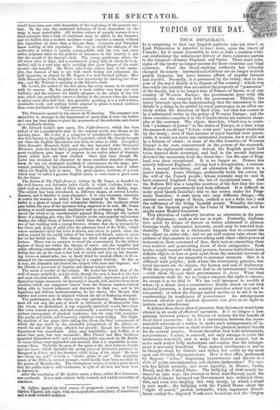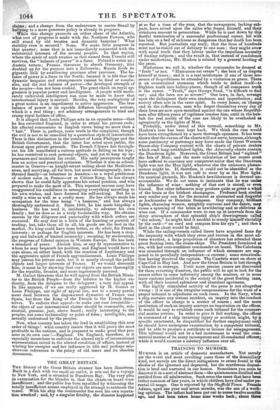TOPICS OF THE DAY.
TRUE DIPLOMACY. IT is surprising to find any English publicist take his stand, as Lord Palmerston is reported to have done, upon the treaty of Utrecht; for it seems impossible to take so false a position with- out overlooking the subsequent history of three countries parties to the compact—France, England, and Spain. Three main prin- ciples of the treaty no longer possess for those countries any vital existence. First, the treaty-making authority has virtually changed its source : international relations are no longer matters purely dynastic, but have become affairs of popular interest and control. Secondly, it is presumed by the treaty, that to dis- pose of the royal family is to dispose of the country : which was
,
true while the country was accounted the property or ' possession" of the family, but is no longer true of France or Spain, or of any country of Western Europe ; the government goes with the country, not the country with the government. Thirdly, the treaty proceeds upon the understanding that the succession to the throne is a thing to be settled by royal personages as an affair en- tirely within the dictation of their class: but that has ceased to be a substantial verity in the Folic), of Western Europe ; and the three countries concerned in the Utrecht treaty are eminent exam- ples to the contrary. The object, therefore, which was to estab- lish " a balance of power " in the states of Europe, at a time when the monarch could say " L'etat—c'est moi," is no longer attainable by the treaty : even if that balance of royal families were practi- cable, it would not serve any substantial purpose, for it would not be a balance of states ; in none of the free countries of Western Europe is the state concentrated in the person of the monarch. Before the eighteenth century, indeed, the English people had twice deposed their sovereign, and had in the second instance diverted the succession from the direct line : but the case of Eng- land was then exceptional. It is no longer so. France has strictly followed England ; having had a decapitation, a restora- tion, a second revolution, and an alienation of the crown to a junior branch. Louis Philippe professedly holds his crown by the will of the French people ; whose example may be said to have removed England from the list of exceptional cases. And the Reform Bill was a tangible assertion of the fact that the doc- trine of popular government had •been affirmed. It is difficult to make good Queen Isabella's title to the crown under the Prag- matic Sanction : it rests upon two very different things,—the ancient national usage of Spain, (which is not a Salic law,) and the sufferance of the living Spanish people. Transfer the sanc- tion of the Spanish people to the Count of Montemolin, and he might enter Madrid tomorrow. This alteration of authority involves an alteration in the prac- tice of diplomacy, such as we see at work. Formerly, diploma- tists acted by means of threats or bribes addressed to princes. Genuine truth, substantial interests, could only be touched inci- dentally. The aim in a diplomatic bargain was to conceal the true object on either side ; and we are told various tales about the address of diplomatists in overreaching each other—their power of insinuation, their command of face, their tact at concealing their own motives and penetrating those of their antagonists. Such tactics might succeed with royal persons, because individuals have definite objects to lose or gain apart from the material interests of nations, and they are amenable to personal interests. But it is different with peoples ; with whom the substantial, genuine, ma- terial interests are the objects, the beacon and end of diplomacy. With the peoples we must now deal in all international relations —with them through their governments de facto. What that government shall be, we no longer arrogate the right to choose ; we accept it as we find it. We can only interpose to modify it when, by a direct (not a constructive) hostile attack on our own material interests, a foreign country provokes actual war and is conquered ; or when the foreign nation invites us to aid it in re- constructing its machinery of government. An arrangement between obsolete and deposed dynasties can give us no right to initiate such interference.
It follows from these altered premises, that diplomacy must have altered in its mode of effectual operation. It is no longer a bar- gaining between princes to dispose of nations for the benefit of their royal possessors ; but it is a convention between the repre- sentative servants of a nation to make such arrangements of in- ternational intercourse as shall evolve the greatest mutual benefit for the several peoples. It must therefore deal with substantials, not pretences ; it must, to succeed, not only arrange to make the intercourse beneficial, and to make the benefit mutual, but to make each nation fully understand and confess that the arrange- ment is mutually beneficial. That mutual intelligence is not to be brought about by threats and bribes, but solely by the most open and friendly representations. How is that office performed by flippant " notes,' disguising impertinence and threats in a style of polite circumlocution and obscure insinuation ? The sys- tem has failed recently, and most signally, in France, Spain, Brazil, and the United States. The bullying of 1840 nearly be- trayed us into war ; the attempt to force Anti-Slavery upon the Spanish Colonies betrayed our Government into technical blun- ders, and even into denying this very treaty, by which a stand is now made ; the bullying with the United States about the "right of search" proved untenable, while ingenuous friend- liness settled the disputed North-east boundary and the Oregon claims ; and a change from the endeavours to coerce Brazil by bullying to a more generous policy is already in progress.
While this change proceeds on either shore of the Atlantic, what sort of progress is made with the Northern Powers' who still stand by old treaties and dynastic bargains ? What i stability even is secured ? None. We make little progress in that quarter; none that is not immediately connected with the substantial interests of the several peoples. In that region, where the spirit of such treaties as that named from Utrecht still survives, the' balance of power" is a farce. Poland is eaten up ; Austria totters ; Prussia threatens to absorb Germany, first doubled up for the purpose into a Zollverein; Russia feeds its gigantic bulk by swallowing province after province. The ba- lance of power is a farce in the North; because it is felt that the dynastic bargains and arrangements cannot be final or conclu- sive, and the real balance o power—the developed strength of the peoples—has not been evoked. The great check on royal ag- gression is popular power and intelligence. 'A people with mode- rately cultivated intelligence can soon be made to know that international injury is mutual. Besides, the very multiplicity of a great nation is an impediment to active aggression. The true balance of power is its equable diffusion throughout nations, which is a real thing ; not arbitrary arrangements to bind and cramp royal holders of office.
It is alleged that Louis Philippe acts in an opposite sense—that he has outwitted England, in order to attain his private ends ; his affected concessions to English views being no more than a " bait." There is, perhaps, some truth in the complaint, though the evil is not to be remedied by a querulous style of lamentation. There is this distinction in the conduct of Louis Philippe and the British Government, that the latter has acted upon public, the former upon private grounds. The French Ulysses has through- out his life manifested a curious aptitude in falling on his legs ; he has contrived to seek personal objects, and yet to keep up ap- pearances and maintain his credit. His early preceptress taught him an active and practical optimism. Whether it was as school- master in Geneva—as knight-errant sailing about the Mediterra- nean, and marrying, all for love, but most advantageously, into a throned family—as volunteer in America—as a royal gentleman of modest mien in France—or as Citizen King, he has always shown that he could fully appretiate his actual position, and was prepared to make the most of it. This repeated success may have exaggerated his confidence in arranging everything according to his own wishes, and have fostered his self-seeking. But he is really a wise as well as a crafty man. He has always made his occupation for the time being " a business," and has always thoroughly understood it. Since 1830, he has made kingship a business. He has used it, incidentally, to advance his own family ; but he does so in a truly businesslike way. He obtains custom by the diligence and punctuality with which orders are executed. He may deal in a little of the humbug or garnish of trading, but, take them all in all, his goods are the best in the market. No king could have done better, on the whole, for French interests ; or perhaps for English interests. He has been a stop- gap and bulwark of limited monarchy ; securing, by moderating, the progress of Liberal opinion in Western Europe. He has been a standard of peace. Abolish him, or any fit representative to whom he may bequeath his position, and England would have to cope alone, on either hand, with the reaction of Legitimacy and the aggressive spirit of French aggrandizement. Louis Philippe may pursue his private ends, but it is mostly through the public objects and larger interests of France. If we would discomfit him, it must be by showing that our objects are more thoroughly for the republic, broader, and more ingenuously pursued. M. Guizot threatens that he will appeal from the,British Minis- ter to the British People—from the inferior to the higher au- thority, from the delegate to the delegates ; a very fair appeal. In like manner, if we are really aggrieved by M. Guizot or Louis Philippe, our right of appeal lies, not to a musty parch- ment deed between the dispossessed dynasties of France and Spain, but from the King of the French to the French them- selves. To enforce that appeal—to make our case irresistible— the object of our international claims should be reasonable, sub- stantial, genuine, just, above board ; really interesting to the peoples, not some technicality or point of form ; intelligible, and actually understood by the peoples.
Now, what country has taken the lead in establishing this new order of things? what country insists, that it will prove the most profitable to the nations, and is prepared to make good that pro- mise in its own case?—England. On England, therefore, is it especially incumbent to cultivate the altered style of international representation suited to the altered condition of affairs, instead of wasting her energies and her influence in idle and perhaps mis- chievous references to the policy of old times and its obsolete documents.



























 Previous page
Previous page